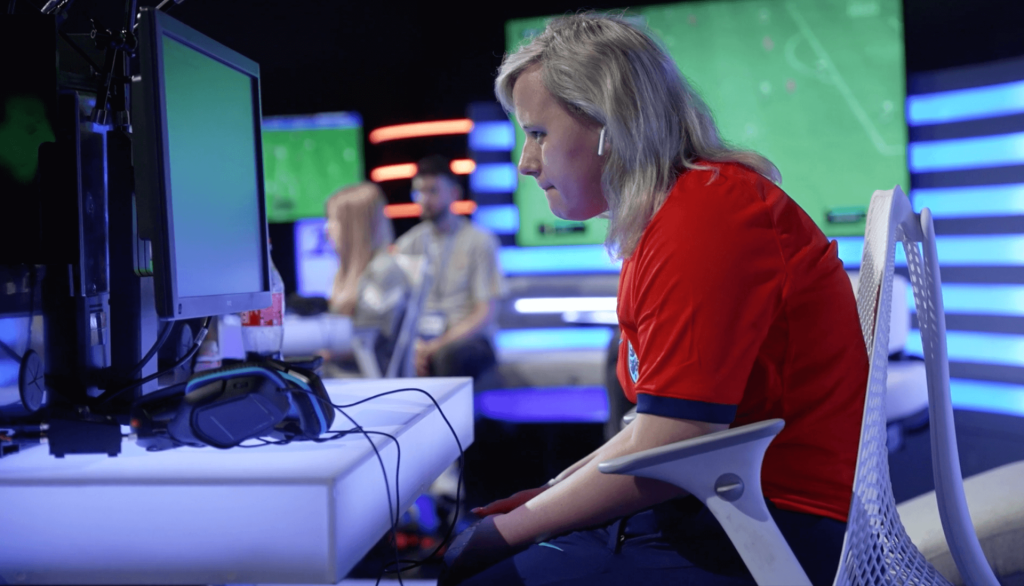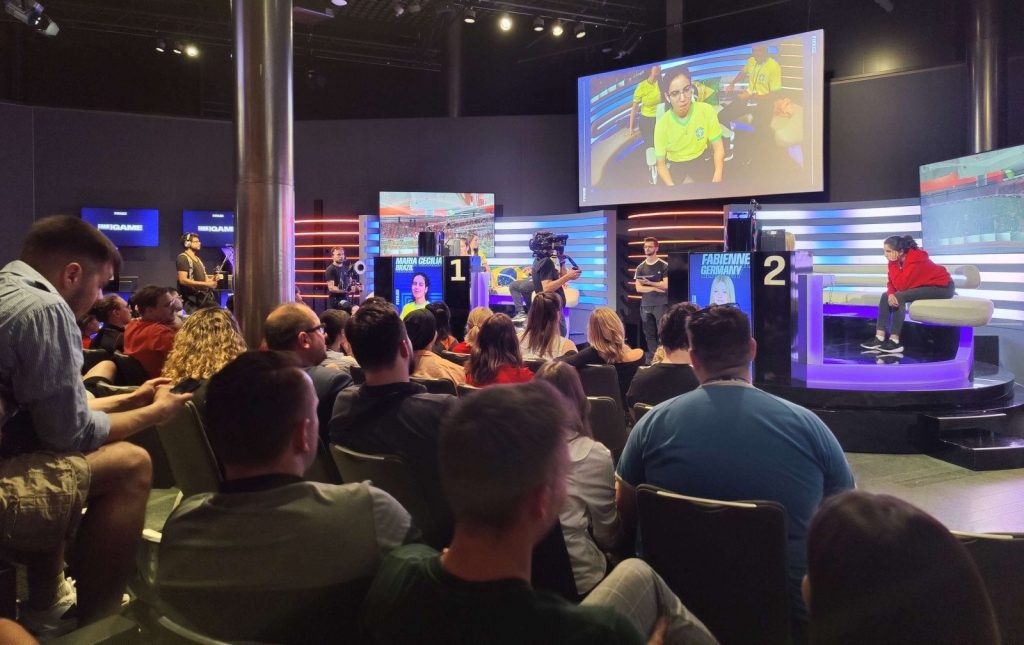
Lisa Manley has come a long way from crowdfunding prize pools online for women’s FIFA tournaments.
The English professional FIFA player, and more recently caster and content creator, placed joint fifth in a LAN tournament during a women’s esports bootcamp organised by FIFA at the FIFA Museum in Zurich, Switzerland in June.
Manley represented the eLionesses, the official esports team for UK women’s football, carrying the hefty weight of the symbolic Three Lions emblem on her jersey. She also received support on official social media channels like England Gaming, support which she told Esports Insider goes a long way in generating exposure for women’s esports.
The bootcamp was part of FAMEHERGAME, an inclusivity programme designed to promote female participation in FIFA’s esports ecosystem. The programme looks to set female FIFA esports players up with the hard and soft skills required to enter esports — competitively or otherwise.
Manley narrowly missed out on the main prize, a fully-expense paid trip to the FIFA Women’s World Cup in July — the physical sport one, that is. But that prize, and the competition itself, wasn’t really the main point of the bootcamp, Adrian Roelli, FIFA’s Head of eFootball, told Esports Insider.
“We’ve been doing this for quite a while and we’ve never seen a woman competing at the highest level, as in at the finals — despite the fact that there are a lot of women in gaming. So we felt that we had to do something and give [women] a space to develop, to make sure that they can meet each other, interact, learn from each other, and also give them the skill set and support them along the way to then become the shining stars.”
“The idea was not just to create competition; we created this whole workshop around these plans, and then it transitioned into a competition,” Roelli said.
Member Associations from around the world chose representatives to send to the bootcamp from their respective countries, alongside nominees chosen by ECL Gaming, a women’s FIFA mentoring organisation.
Organised and funded by FIFAe, football governing body FIFA’s competitive gaming department, the bootcamp included media training, psychology training, content creation and brand growth workshops, anti-toxicity support, and a number of other sessions.
The training was designed to equip Manley and her peers with the skills female esports talents often miss out on due to the difficulty of engaging in a notoriously toxic and male-dominated discipline.

The well-funded and high-profile LAN event — a rarity in women’s FIFA esports, indeed women’s esports in general — was broadcast on official channels, but Nas Baig, Founder of ECL Gaming, told Esports Insider it was the work they did behind the camera that was more important.
“It’s really difficult when you’re first starting out [as a female player] to know exactly where you are, how you navigate things, how you do this or that. What we try to do is help them understand what they need to do.
“It’s all about providing the right infrastructure and pathways for girls to progress, whether that’s professional gaming, content creators — anything within the esports space. … We try to help [young female players] understand their long term objectives, help them navigate that, and understand what they need to do.”
Women’s esports more broadly has seen a rise in interest recently, a result of increasing commitments to promoting diversity in esports. VALORANT’s female league, VALORANT Game Changers, saw major viewership success at its most recent championship; a women’s Mobile Legends: Bang Bang event broke the record in May for female esports viewership, and other games like CS:GO and Rocket League are seeing investment from teams and tournament organisers into their female ecosystems.
For women’s esports scenes like FIFA’s to be sustainable, though, stakeholders must help build the grassroots first, not just the top tier. Going beyond surface-level EDI commitments is the key to making female teams sustainable in the long run, Baig added.
“It’s very easy to come in with the mindset that ‘I’m just doing this because I think I should be doing this’ — that won’t work. But if you actually believe in what bringing a female [player] onto your team will do, they can open up new revenue streams. If done right, it can absolutely help organisations, but they need to activate properly.”
The Zurich bootcamp was in large part designed to do this; to set female players up to be able to offer value to teams, via a focus on improving content and social media output, on-air personality, and other assets teams look for outside competitive performance.
“I think this event will actually help discover players who we haven’t seen before,” Manley explained. “There’s certain people who haven’t shown themselves before but now they’re here and showing themselves on camera, on social media, they may well get signed. I think it’s massive.”
Setup the grassroots, and the rest comes naturally. “Our goal,” FIFAe’s Roelli explained, “is to make sure that we have these role models that can go pro, whether that’s on the playing side or on the content creation side, to be the shining stars to then attract more women to follow and pursue a career in esports.”
The FAMEHERGAME bootcamp is one small piece of a much, much larger puzzle that even an organisation the size and stature of FIFA can’t solve on its own. But what it’s doing is more than just a splash in the bucket, and arguably much more impactful than running one-off isolated competitive events that fail to stimulate the rest of the scene.
Through FAMEHERGAME, FIFA is widening participation to underserved communities and helping build a women’s grassroots scene — while also strategically broadening its esports fanbase.
